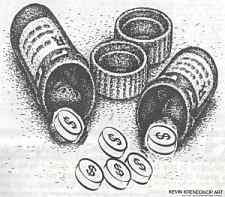As a person who has spent many summers in Washington County, I hail Maine for recently passing the law making it the first state to become the bulk-purchasing agent of prescription drugs for uninsured citizens, thereby obtaining the same discounts that drug companies give HMOs. The retaliatory decision of SmithKline Beecham to discontinue selling drugs in Maine is spiteful and malicious. I agree with Clifford Rosen, director of St. Joseph Hospital’s Maine Center for Osteoporosis Research in Bangor, that this move is “blackmail” geared to intimidate people (BDN, Aug. 4).
 It is a crime that pharmaceutical companies make huge profits off the pain of people, especially senior citizens, many of whom testified at hearings in Augusta about the agony of being forced to choose between food and medicine. According to Fortune 500 figures, the 1999 profit-to-revenue ratio of the pharmaceutical industry was 18.6 percent — the highest profit margin of any U.S. industry. And the top 12 pharmaceutical companies made $10 billion more than the top 24 motor vehicle corporations.
It is a crime that pharmaceutical companies make huge profits off the pain of people, especially senior citizens, many of whom testified at hearings in Augusta about the agony of being forced to choose between food and medicine. According to Fortune 500 figures, the 1999 profit-to-revenue ratio of the pharmaceutical industry was 18.6 percent — the highest profit margin of any U.S. industry. And the top 12 pharmaceutical companies made $10 billion more than the top 24 motor vehicle corporations.
Pharmaceutical giants are viciously determined to increase their gargantuan profits no matter how much pain, hardship and even death they may cause. Indeed, the industry spends millions of dollars lobbying against prescription drug legislation. Their cry that reducing profit will force them to cut back on research and development is unfounded. According to “The Prescription Drug Fairness for Seniors Act: Industry Myths Vs. Reality,” a congressional report commissioned by Rep. Tom Allen, D-Maine, after Congress enacted prescription drug legislation — in 1984 increasing the availability of generic drugs, and in 1990 creating the Medicaid drug rebate — the pharmaceutical industry more than doubled its spending on research and development.
Profit is the one motivation of the pharmaceutical industry, not usefulness to people’s lives. It is urgent for people everywhere to know what Eli Siegel, the important American educator who founded the philosophy Aesthetic Realism, showed: Our economy, the profit system, is based on contempt for people — “the addition to self through the lessening of something else.” Thirty years ago, Siegel explained that the profit system had failed because its unethical basis no longer worked. “There will be no economic recovery,” he wrote in Goodbye Profit System: Update, “… until economics itself, the making of money, the having of jobs, becomes ethical; is based on good will rather than on the ill will which has been predominant for centuries.”
Ellen Reiss, the Aesthetic Realism Chairman of Education, expressed the feelings of people all over America when she wrote in the international periodical The Right of Aesthetic Realism to Be Known, “Never was there more fury at drug companies. Americans know that these companies use people’s need for medicine to charge exorbitant prices. Because pharmacy is based on profit, many men, women and children cannot get the medication they need. And senior citizens can go without sufficient food in order to pay for medicine. There is in Americans a real hate of the fact that what one needs for health is tied in with profit.”
This intense objection is part of what Siegel described as the “force of ethics working in history,” which is ending the profit system, and it is beautiful. People in Maine should be so proud and heartened to know that the new drug prescription law arises from ethics as a force.
Our health care system will be a brutal, cruel failure until everyone — including hospital administrators, HMO personnel, pharmaceutical executives — answers this urgent ethical question asked by Siegel: “What does a person deserve by being alive?” Every human being deserves complete health coverage. Siegel’s passion about this was immense. “Nobody should ever have to pay for having his body [cared for], even if he wanted to pay,” he said in a National Ethics Report in 1968: “The idea of people worried about their health [and] worried about money is barbarous. It’s ego corruption.”
Sally Ross has been a New York City high school biology teacher for 20 years and writes frequently on the value of Aesthetic Realism.

